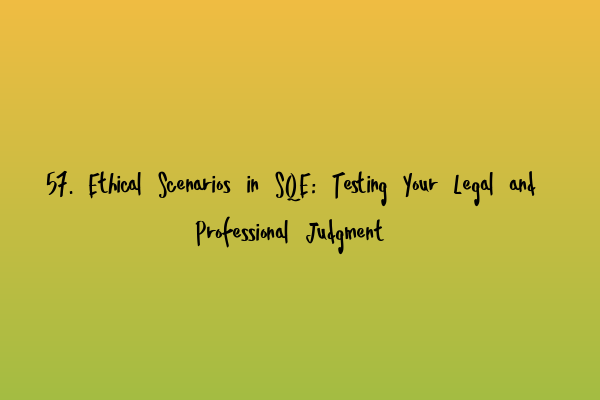57. Ethical Scenarios in SQE: Testing Your Legal and Professional Judgment
As aspiring solicitors, the ability to navigate ethical situations is an essential skill. The Solicitors Qualifying Examination (SQE) is designed to test your legal knowledge, but also your professional judgment. In this blog post, we will explore 57 ethical scenarios that you may encounter in the SQE and provide strategies for tackling them.
1. Conflict of Interest: Imagine you have been approached by a close friend to represent them in a legal matter. However, you have prior knowledge of confidential information related to the opposing party. How would you handle this situation?
2. Client Confidentiality: In the midst of a high-profile case, a reporter offers you a substantial sum of money for confidential information about your client. What steps would you take to protect client confidentiality while also considering financial gain?
3. Whistleblowing: You discover that your firm is engaged in unethical practices. Would you blow the whistle on your colleagues, and if so, what steps would you take to protect yourself and maintain your professional obligations?
4. Bias and Discrimination: You are assigned a case involving a client who holds controversial views that conflict with your own beliefs. How would you ensure impartiality and provide effective representation while managing your personal biases?
5. Duty to the Court: Your client instructs you to present evidence that you know to be false. How would you uphold your duty to the court while maintaining a strong relationship with your client?
Navigating these ethical scenarios requires a deep understanding of the Solicitors Regulatory Authority (SRA) Code of Conduct. Familiarize yourself with the Code and its provisions to ensure you are well-prepared for SQE exam questions that may test your ethical judgment.
In addition to studying the Code, practicing SQE 1 exam questions can help you improve your decision-making skills in ethical scenarios. Check out our SQE 1 Practice Exam Questions article for a comprehensive resource to enhance your preparation.
To simulate real-world scenarios, incorporating SQE 1 practice mocks like FLK1 and FLK2 can be immensely beneficial. These practice mocks provide you with diverse ethical scenarios, enabling you to assess your legal and professional judgment. Visit our SQE 1 Practice Mocks FLK1 FLK2 article to access these valuable resources.
While SQE 1 and SQE 2 preparation courses focus on imparting legal knowledge, they also address ethical considerations. Engaging in these courses provides an opportunity to discuss ethical scenarios with experienced tutors and fellow students, enhancing your understanding and judgment. Explore our SQE 2 Preparation Courses and SQE 1 Preparation Courses articles to find the right course for you.
Remember to stay updated on SRA SQE exam dates to plan your preparation effectively. Knowing the exam schedule allows you to allocate sufficient time to practice ethical scenarios and familiarize yourself with the SRA Code of Conduct.
In conclusion, navigating ethical scenarios in the SQE requires a balance of legal knowledge and professional judgment. By exploring various ethical scenarios, studying the SRA Code of Conduct, and practicing through SQE 1 exam questions and practice mocks, you can develop the skills necessary to tackle ethical challenges confidently. Prepare yourself thoroughly, so you can excel in the SQE and embark on a successful legal career.
For more information and resources related to SQE preparation, visit our website. Stay tuned for more articles on various topics to aid your SQE success. Good luck!
